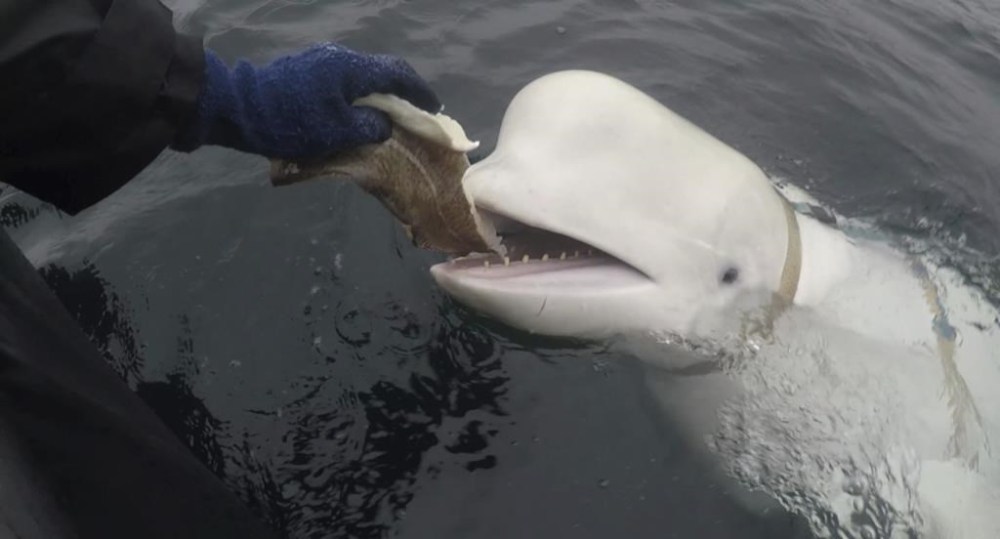Russian ‘spy whale’ in Norway wasn’t shot dead, likely died of bacterial infection
Advertisement
Read this article for free:
or
Already have an account? Log in here »
To continue reading, please subscribe:
Monthly Digital Subscription
$0 for the first 4 weeks*
- Enjoy unlimited reading on winnipegfreepress.com
- Read the E-Edition, our digital replica newspaper
- Access News Break, our award-winning app
- Play interactive puzzles
*No charge for 4 weeks then price increases to the regular rate of $19.95 plus GST every four weeks. Offer available to new and qualified returning subscribers only. Cancel any time.
Monthly Digital Subscription
$4.99/week*
- Enjoy unlimited reading on winnipegfreepress.com
- Read the E-Edition, our digital replica newspaper
- Access News Break, our award-winning app
- Play interactive puzzles
*Billed as $19.95 plus GST every four weeks. Cancel any time.
To continue reading, please subscribe:
Add Free Press access to your Brandon Sun subscription for only an additional
$1 for the first 4 weeks*
*Your next subscription payment will increase by $1.00 and you will be charged $16.99 plus GST for four weeks. After four weeks, your payment will increase to $23.99 plus GST every four weeks.
Read unlimited articles for free today:
or
Already have an account? Log in here »
Hey there, time traveller!
This article was published 04/10/2024 (463 days ago), so information in it may no longer be current.
OSLO, Norway (AP) — A beluga whale that lived off Norway’s coast and whose harness ignited speculation that it was a Russian spy, was not shot to death as claimed by animal rights groups but died of a bacterial infection, Norwegian police said Friday.
A final autopsy by Norway’s Veterinary Institute “concludes that the probable cause of death was bacterial infection — possibly as a result of a wound in the mouth from a stuck stick,” Amund Preede Revheim, head of the North Sea and Environment section of the police in south-western Norway said.
“There have been no findings from the autopsy that indicate that the whale has been shot,” he stressed, adding that the autopsy had been “made difficult by the fact that many of the whale’s organs were very rotten.” As there was no indication of foul play, there was no reason to start a criminal investigation into its death, Preede Revheim said.

The tame beluga, which was first spotted in 2019 not far from Russian waters with a harness reading “Equipment St. Petersburg,” had been nicknamed “Hvaldimir,” combining the Norwegian word for whale — hval — and the first name of Russian President Vladimir Putin.
It was found floating in a southern Norway bay on Aug. 31.
In September, animal advocate groups OneWhale and NOAH filed a police report saying that the animal’s wounds suggested it was intentionally killed.
They pointed at several wounds found on the animal’s skin, including what was interpreted as a bullet hole.
“Assessments made by the Veterinary Institute and the police’s forensic technicians are that these are not gunshot wounds. X-rays of the chest and head were carried out without any projectiles or other metal fragments being detected,” police said in a statement.
Earlier, police had described a stick about 35 centimeters (14 inches) long and 3 centimeters (1 inch) wide which was found wedged in the animal’s mouth, its stomach was empty and its organs had broken down, police said. No further details were given.
The 4.2-meter (14-foot) long and 1,225-kilogram (2,700-pound) whale was first spotted by fishermen not far from the Arctic town of Hammerfest.
Its harness, along with what appeared to be a mount for a small camera, led to media speculation that it was a “spy whale.” Experts say the Russian navy is known to have trained whales for military purposes. Media reports also have speculated that the whale might have been trained as a therapy animal.
There was no immediate reaction from OneWhale or NOAH.

